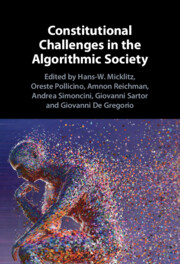
-
Select format
-
- Publisher:
- Cambridge University Press
- Publication date:
- November 2021
- December 2021
- ISBN:
- 9781108914857
- 9781108843126
- 9781108823890
- Creative Commons:
-
This content is Open Access and distributed under the terms of the Creative Commons Attribution licence CC-BY-NC-ND 4.0.
https://creativecommons.org/creativelicenses - Dimensions:
- (229 x 152 mm)
- Weight & Pages:
- 0.66kg, 342 Pages
- Dimensions:
- (229 x 152 mm)
- Weight & Pages:
- 0.51kg, 340 Pages
Open AccessYou have access to this book
Book description
New technologies have always challenged the social, economic, legal, and ideological status quo. Constitutional law is no less impacted by such technologically driven transformations, as the state must formulate a legal response to new technologies and their market applications, as well as the state's own use of new technology. In particular, the development of data collection, data mining, and algorithmic analysis by public and private actors present unique challenges to public law at the doctrinal as well as the theoretical level. This collection, aimed at legal scholars and practitioners, describes the constitutional challenges created by the algorithmic society. It offers an important synthesis of the state of play in law and technology studies, addressing the challenges for fundamental rights and democracy, the role of policy and regulation, and the responsibilities of private actors. This title is also available as Open Access on Cambridge Core.
Contents
Full book PDF-
Constitutional Challenges in the Algorithmic Society
pp i-ii -
-
- You have access
- Open access
- HTML
- Export citation
-
-
Constitutional Challenges in the Algorithmic Society - Title page
pp iii-iii -
-
- You have access
- Open access
- HTML
- Export citation
-
-
Copyright page
pp iv-iv -
-
- You have access
- Open access
- HTML
- Export citation
-
-
Contents
pp v-vi -
-
- You have access
- Open access
- HTML
- Export citation
-
-
Figures
pp vii-vii -
-
- You have access
- Open access
- HTML
- Export citation
-
-
Contributors
pp viii-ix -
-
- You have access
- Open access
- HTML
- Export citation
-
-
Acknowledgements
pp x-x -
-
- You have access
- Open access
- HTML
- Export citation
-
-
Introduction
pp 1-2 -
-
- You have access
- Open access
- HTML
- Export citation
-
-
1 - Constitutional Law in the Algorithmic Society
pp 3-24 -
-
-
- You have access
- Open access
- HTML
- Export citation
-
-
Part I - Algorithms, Freedom, and Fundamental Rights
pp 25-128 -
-
- You have access
- Open access
- HTML
- Export citation
-
-
2 - Fundamental Rights and the Rule of Law in the Algorithmic Society
pp 27-41 -
-
-
- You have access
- Open access
- HTML
- Export citation
-
-
4 - Constitutional Challenges in the Emotional AI Era
pp 57-77 -
-
-
- You have access
- Open access
- HTML
- Export citation
-
-
5 - Algorithmic Law: Law Production by Data or Data Production by Law?
pp 78-92 -
-
-
- You have access
- Open access
- HTML
- Export citation
-
-
6 - Human Rights and Algorithmic Impact Assessment for Predictive Policing
pp 93-110 -
-
-
- You have access
- Open access
- HTML
- Export citation
-
-
Part II - Regulation and Policy
pp 129-260 -
-
- You have access
- Open access
- HTML
- Export citation
-
-
8 - Algorithms and Regulation
pp 131-181 -
-
-
- You have access
- Open access
- HTML
- Export citation
-
-
9 - AI, Governance and Ethics
pp 182-201 - Global Perspectives
-
-
-
- You have access
- Open access
- HTML
- Export citation
-
-
Part III - Roles and Responsibilities of Private Actors
pp 261-262 -
-
- You have access
- Open access
- HTML
- Export citation
-
-
13 - Responsibilities of Companies in the Algorithmic Society
pp 263-280 -
-
-
- You have access
- Open access
- HTML
- Export citation
-
-
14 - Consumer Law as a Tool to Regulate Artificial Intelligence
pp 281-297 -
-
-
- You have access
- Open access
- HTML
- Export citation
-
-
16 - Smart Contracts and Automation of Private Relationships
pp 315-330 -
-
-
- You have access
- Open access
- HTML
- Export citation
-
Metrics
Altmetric attention score
Full text views
Full text views help Loading metrics...
Loading metrics...
* Views captured on Cambridge Core between #date#. This data will be updated every 24 hours.
Usage data cannot currently be displayed.
Accessibility standard: Unknown
Why this information is here
This section outlines the accessibility features of this content - including support for screen readers, full keyboard navigation and high-contrast display options. This may not be relevant for you.
Accessibility Information
Accessibility compliance for the PDF of this book is currently unknown and may be updated in the future.


